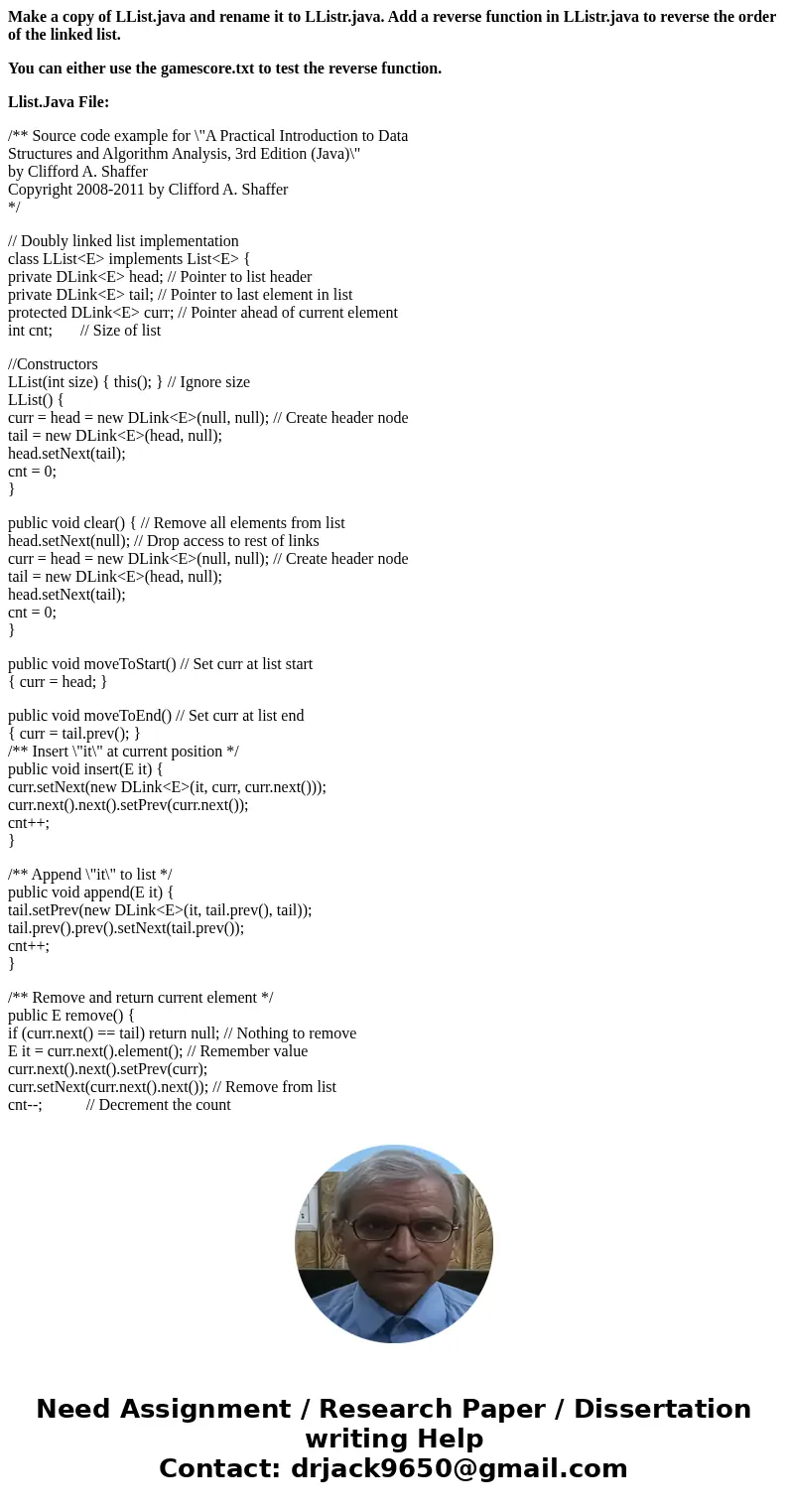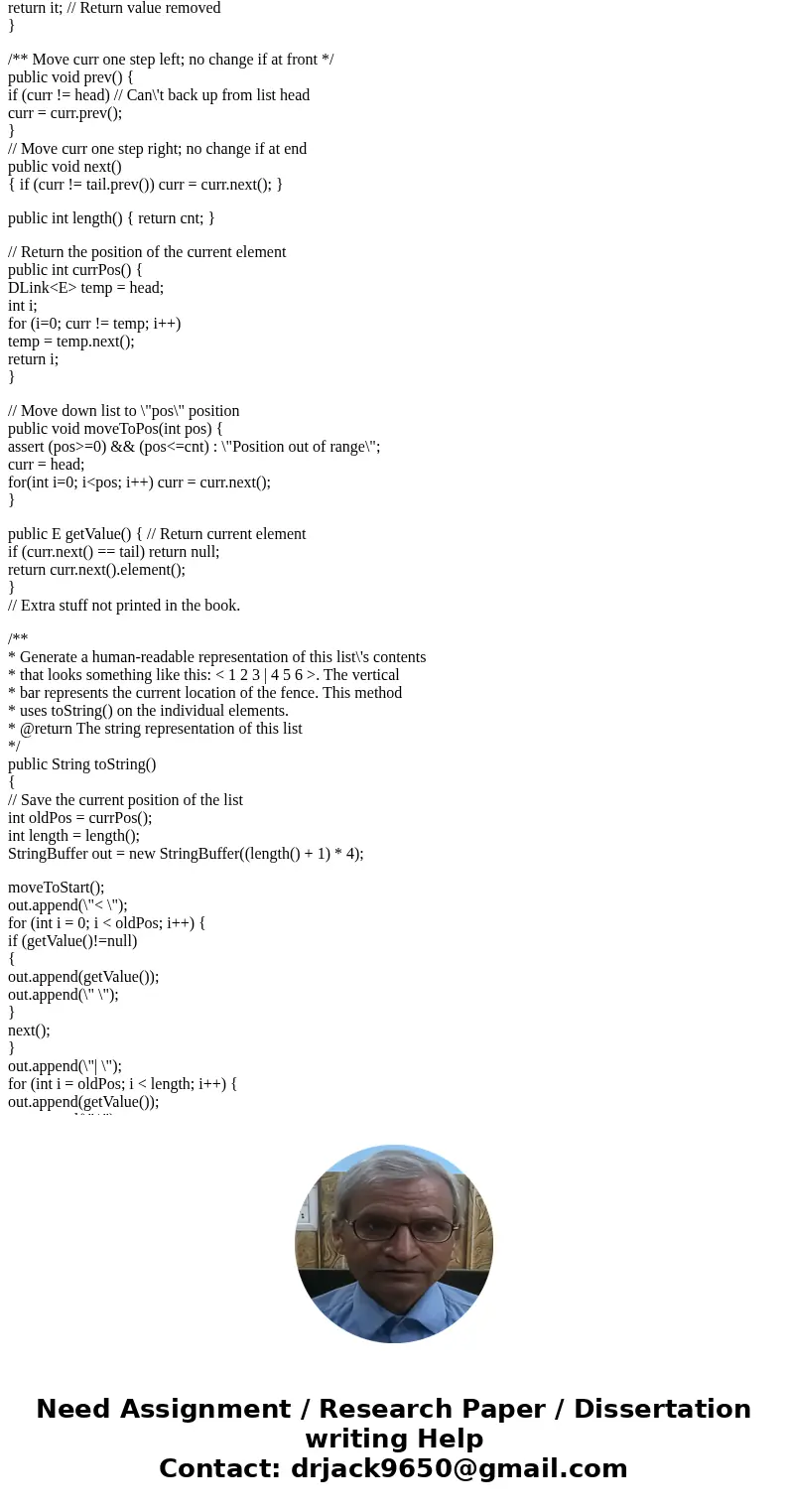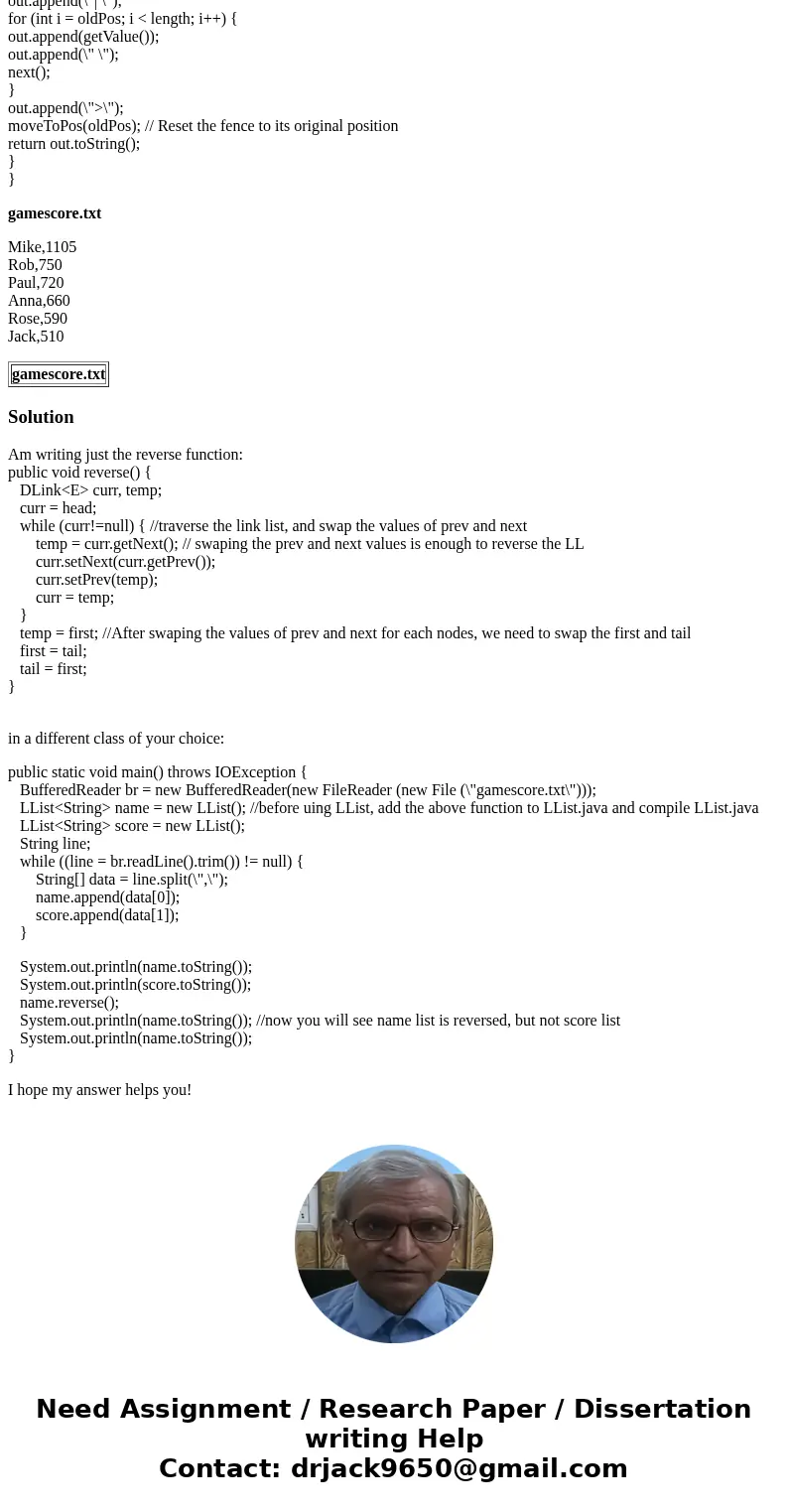Make a copy of LListjava and rename it to LListrjava Add a r
Make a copy of LList.java and rename it to LListr.java. Add a reverse function in LListr.java to reverse the order of the linked list.
You can either use the gamescore.txt to test the reverse function.
Llist.Java File:
/** Source code example for \"A Practical Introduction to Data
Structures and Algorithm Analysis, 3rd Edition (Java)\"
by Clifford A. Shaffer
Copyright 2008-2011 by Clifford A. Shaffer
*/
// Doubly linked list implementation
class LList<E> implements List<E> {
private DLink<E> head; // Pointer to list header
private DLink<E> tail; // Pointer to last element in list
protected DLink<E> curr; // Pointer ahead of current element
int cnt; // Size of list
//Constructors
LList(int size) { this(); } // Ignore size
LList() {
curr = head = new DLink<E>(null, null); // Create header node
tail = new DLink<E>(head, null);
head.setNext(tail);
cnt = 0;
}
public void clear() { // Remove all elements from list
head.setNext(null); // Drop access to rest of links
curr = head = new DLink<E>(null, null); // Create header node
tail = new DLink<E>(head, null);
head.setNext(tail);
cnt = 0;
}
public void moveToStart() // Set curr at list start
{ curr = head; }
public void moveToEnd() // Set curr at list end
{ curr = tail.prev(); }
/** Insert \"it\" at current position */
public void insert(E it) {
curr.setNext(new DLink<E>(it, curr, curr.next()));
curr.next().next().setPrev(curr.next());
cnt++;
}
/** Append \"it\" to list */
public void append(E it) {
tail.setPrev(new DLink<E>(it, tail.prev(), tail));
tail.prev().prev().setNext(tail.prev());
cnt++;
}
/** Remove and return current element */
public E remove() {
if (curr.next() == tail) return null; // Nothing to remove
E it = curr.next().element(); // Remember value
curr.next().next().setPrev(curr);
curr.setNext(curr.next().next()); // Remove from list
cnt--; // Decrement the count
return it; // Return value removed
}
/** Move curr one step left; no change if at front */
public void prev() {
if (curr != head) // Can\'t back up from list head
curr = curr.prev();
}
// Move curr one step right; no change if at end
public void next()
{ if (curr != tail.prev()) curr = curr.next(); }
public int length() { return cnt; }
// Return the position of the current element
public int currPos() {
DLink<E> temp = head;
int i;
for (i=0; curr != temp; i++)
temp = temp.next();
return i;
}
// Move down list to \"pos\" position
public void moveToPos(int pos) {
assert (pos>=0) && (pos<=cnt) : \"Position out of range\";
curr = head;
for(int i=0; i<pos; i++) curr = curr.next();
}
public E getValue() { // Return current element
if (curr.next() == tail) return null;
return curr.next().element();
}
// Extra stuff not printed in the book.
/**
* Generate a human-readable representation of this list\'s contents
* that looks something like this: < 1 2 3 | 4 5 6 >. The vertical
* bar represents the current location of the fence. This method
* uses toString() on the individual elements.
* @return The string representation of this list
*/
public String toString()
{
// Save the current position of the list
int oldPos = currPos();
int length = length();
StringBuffer out = new StringBuffer((length() + 1) * 4);
moveToStart();
out.append(\"< \");
for (int i = 0; i < oldPos; i++) {
if (getValue()!=null)
{
out.append(getValue());
out.append(\" \");
}
next();
}
out.append(\"| \");
for (int i = oldPos; i < length; i++) {
out.append(getValue());
out.append(\" \");
next();
}
out.append(\">\");
moveToPos(oldPos); // Reset the fence to its original position
return out.toString();
}
}
gamescore.txt
Mike,1105
Rob,750
Paul,720
Anna,660
Rose,590
Jack,510
| gamescore.txt |
Solution
Am writing just the reverse function:
public void reverse() {
DLink<E> curr, temp;
curr = head;
while (curr!=null) { //traverse the link list, and swap the values of prev and next
temp = curr.getNext(); // swaping the prev and next values is enough to reverse the LL
curr.setNext(curr.getPrev());
curr.setPrev(temp);
curr = temp;
}
temp = first; //After swaping the values of prev and next for each nodes, we need to swap the first and tail
first = tail;
tail = first;
}
in a different class of your choice:
public static void main() throws IOException {
BufferedReader br = new BufferedReader(new FileReader (new File (\"gamescore.txt\")));
LList<String> name = new LList(); //before uing LList, add the above function to LList.java and compile LList.java
LList<String> score = new LList();
String line;
while ((line = br.readLine().trim()) != null) {
String[] data = line.split(\",\");
name.append(data[0]);
score.append(data[1]);
}
System.out.println(name.toString());
System.out.println(score.toString());
name.reverse();
System.out.println(name.toString()); //now you will see name list is reversed, but not score list
System.out.println(name.toString());
}
I hope my answer helps you!



 Homework Sourse
Homework Sourse